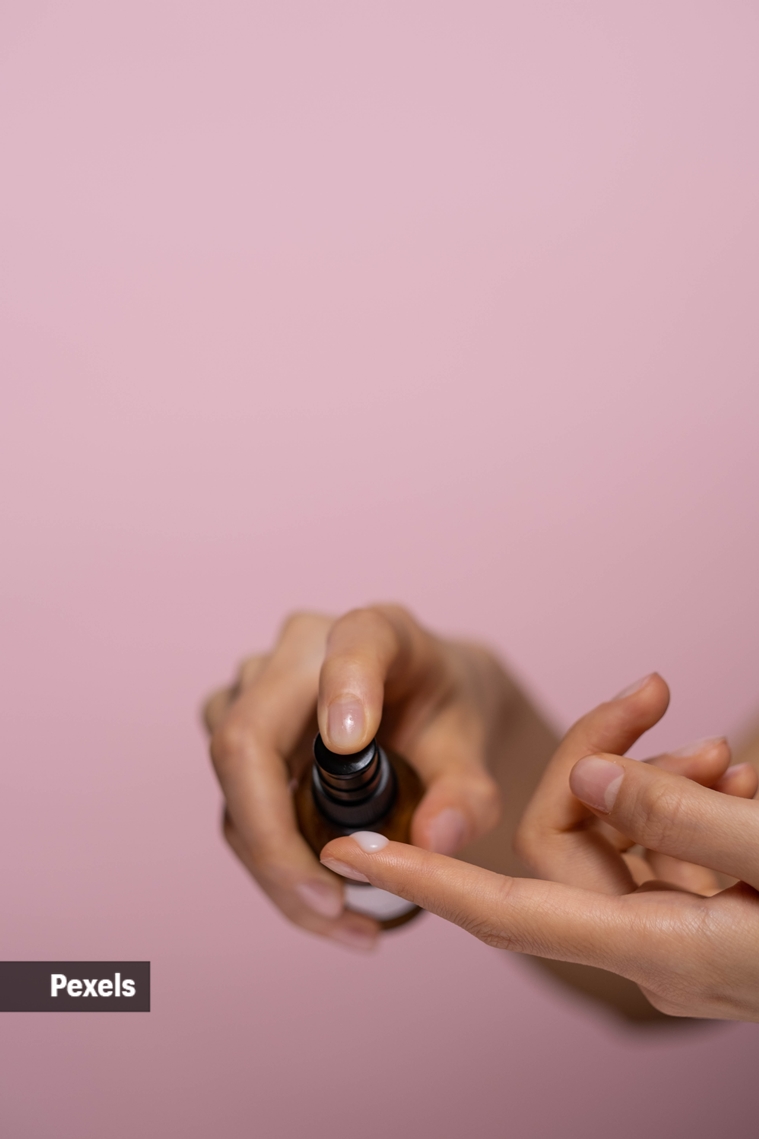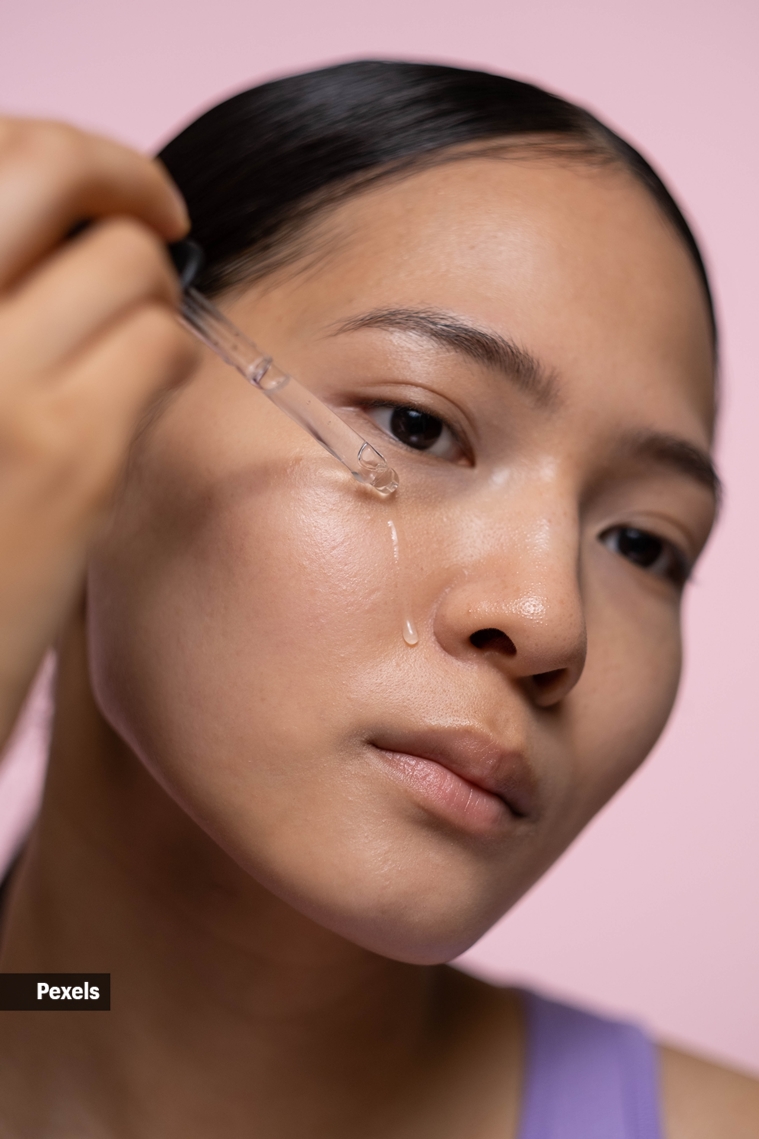The mention of alcohol in the ingredient list of skincare and personal care products is often frowned upon. But, there are two kinds of alcohol — the good and the bad. While the former can make your skincare products more effective, depending on your skin type, the latter can cause irritation, redness, and allergic reactions, as well as long term damage like dryness and a compromised skin barrier.
Usually found in perfumes, moisturisers, sanitisers, etc., alcohol is added “as a solvent to dissolve oil, an antiseptic to kill bacteria, as a buffer to get the right pH, and as an agent of drug delivery”, says Dr Gunjan, lead dermatologist at Proactive for Her.
Why is alcohol used in skincare products?
“There are two purposes of using simple alcohol, like ethanol and isopropyl in skincare products — firstly, to dissolve some active ingredients that cannot be dissolved in water. Secondly, alcohol penetrates very fast into the skin. So, for some products which cannot enter the skin, alcohol is used to make their absorption better,” explained Dr Manjul Aggarwal, senior consultant dermatologist, Fortis Hospital, Shalimar Bagh.
https://images.indianexpress.com/2020/08/1×1.png 
 Alcohol is added “as a solvent to dissolve oil, an antiseptic to kill bacteria, as a buffer to get the right pH, and as an agent of drug delivery”, says Dr Gunjan(Photo: Pexels)
Alcohol is added “as a solvent to dissolve oil, an antiseptic to kill bacteria, as a buffer to get the right pH, and as an agent of drug delivery”, says Dr Gunjan(Photo: Pexels)
Agreed Dr Gunjan, and added that alcohol reduces oil/bacteria in cases of acne/oily skin and acts as drug delivery agent. For instance, minoxidil solution has alcohol in it, which is used for androgenetic hair loss. Alcohol also reduces bacteria fungi/viruses when used in sanitizers, a staple nowadays. While cetyl alcohol acts as a gentle cleanser for sensitive skin, benzyl alcohol, found naturally in fruits like apricots and cranberries as well as essential oils like ylang ylang, acts as a preservative and has a bacteriostatic effect in cosmetics and creams. However, it can cause an allergy, too.
|It is important to read the ingredients that go into your skincare; here’s why
Dr Aggarwal also pointed out that products which contain simple alcohol are not appropriate for dry and sensitive skin types as well as for people with eczema, as alcohol evaporates fast, and can dry the skin out further. “But, on the other hand, for oily and acne-prone skin, you can use them as solvents,” she mentioned.
As for high molecular alcohol, or fatty alcohol like cetyl alcohol, Dr Aggarwal pointed out that these are usually added to moisturisers to make them thick, heavy, and emollient. “They make our skin soft, smooth, and hydrated to prevent dryness. These heavy weight alcohols retain water and also help in reduced water loss from our skin. However, its effectiveness depends on the skin type.”
Good alcohol and bad alcohol

 When used for only shorter periods, it may feel degreased or less oily, but over time ‘bad alcohol’ types will cause the skin to dry out and cause irritation (Photo: Pexels)
When used for only shorter periods, it may feel degreased or less oily, but over time ‘bad alcohol’ types will cause the skin to dry out and cause irritation (Photo: Pexels)
According Dr Gunjan, “Some alcohol types, that are rich in fatty acid, are usually gentle and mild and frequently used in skin care products. For example, cetyl alcohol, propylene glycol, stearyl alcohol, lauryl alcohol, and isopropyl myristate gently moisturize, hydrate, and repair the skin barrier. Retinol (a vitamin A derivative), which is an alcohol too, is an excellent anti aging and anti acne ingredient.”
|Beware! These common DIY ingredients can harm your skin
She also mentioned the ‘bad alcohol’ types that are harsh on the skin. “When used for only shorter periods, it may feel degreased or less oily, but over time they will cause the skin to dry out and cause irritation, like ethanol, propranolol, methyl alcohol, benzyl alcohol.”
How much alcohol is too much alcohol?
Both experts agreed that alcohol is only good for the skin when used in limited quantities. Even though avoiding alcohol-based products altogether may not be ideal as fatty alcohol improves the the quality of some skincare products, “if you have dry, sensitive skin, or you have rosacea, then you must avoid all products that contain alcohol. Also, products with high concentration of harsh alcohols should be used with caution or not used at all,” warns Dr Gunjan.
But, how do you tell which product contains a high concentration of alcohols? Dr Aggarwal suggested simply checking at what level is alcohol mentioned in the ingredient list. If it is the number one ingredient, it means the concentration is quite high. But if it is after five or six ingredients, then the concentration is low.
📣

